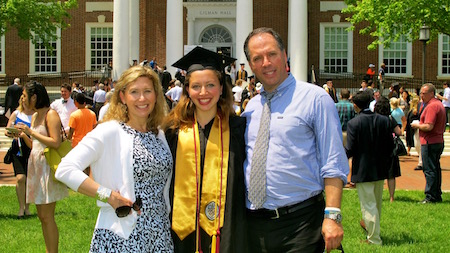
After completing a grueling 4-year academic experience at Johns Hopkins balancing a major in Biomedical Engineering, a major in Applied Math & Statistics and a minor in Entreprenurship & Management, I was surprisingly uncertain of where I wanted to take my life upon graduation.

Despite all the classes and labs required to earn a degree in Engineering, I really didn't know what to expect as I applied it in an industry setting. I was excited to begin working at Medtronic in R&D, where I contributed to the development of a powered tissue stapler by analyzing prototype performance on functional testers, evaluating design modifications, and creating technical documentation to help launch the product. I loved the collaborative aspect of R&D, and it was wonderful to work with talented engineers who share my passion for advancing technology to improve healthcare. The learning curve was steep, since my research experience at Hopkins focused on "wet lab" cell/tissue engineering with less emphasis on mechanical engineering. But from my first day to my last at Medtronic, I was acquiring new skills, meeting people from various groups, and finding new ways to contribute to the product.
All around me, I was hearing about the power of big data and the massive need for programmers, analysts, and data scientists to help companies make sense of it all. I had some exposure to coding at Hopkins, as many of our problem sets relied on MATLAB, Excel, and Java. Although many of my peers dreaded the assignments that required graphs or data processing with MATLAB, I was always excited to see how coding could make calculations and data visualization more efficient. In the year after graduating, I began taking courses on Codecademy like HTML/CSS, SQL, JavaScript, and my personal favorite: Python. Practicing coding was (dare I say) fun! I found myself continuing on my Codecademy track in my free time rather than watching my favorite TV shows. I loved the idea of starting with a task in mind and finding the most efficient path to accomplish it, continuously adding to the tools in my toolkit with new vocabulary and functionality of each language. I decided to transition to a career in data science in order to find the perfect harmony between my engineering/statistics background and newfound love of coding.
I didn't know exactly which characteristics composed a successful data scientist, but I soon learned that a technical mindset (check!) and strong communication skills would serve me well in this career path. And of course, I would continue to leverage my neverending supply of "curiosity, creativity, and grit". The idea of a coding "bootcamp" seemed like the perfect entryway to get formalized data science instruction and real-world project experience. So I studied hard, applied to Metis, and next thing I knew I was moving to New York feeling like the sky was the limit.
We just wrapped up Week 1 of the bootcamp, and I could not be happier with my decision to pursue data science with Metis. I'm still shocked that in just 4 days, I was able to produce data-driven insights to a "client" in order to help them optimize recruitment for a Women in Tech event by stationing their street team volunteers at various subway stations around the city. My group and I analyzed MTA turnstile data to determine the best time and locations to acquire signatures and donations near subway stations and supplemented this with socioeconomic data describing the demographics around each subway station. I'm so happy to be a part of Cohort 6 and surround myself with talented individuals who each bring a diverse background and various motivations for studying data science. The hours are long and the curriculum is packed, but I love the challenge and never-ending excitement of data science. Can't wait to see what the next 11 weeks bring!
